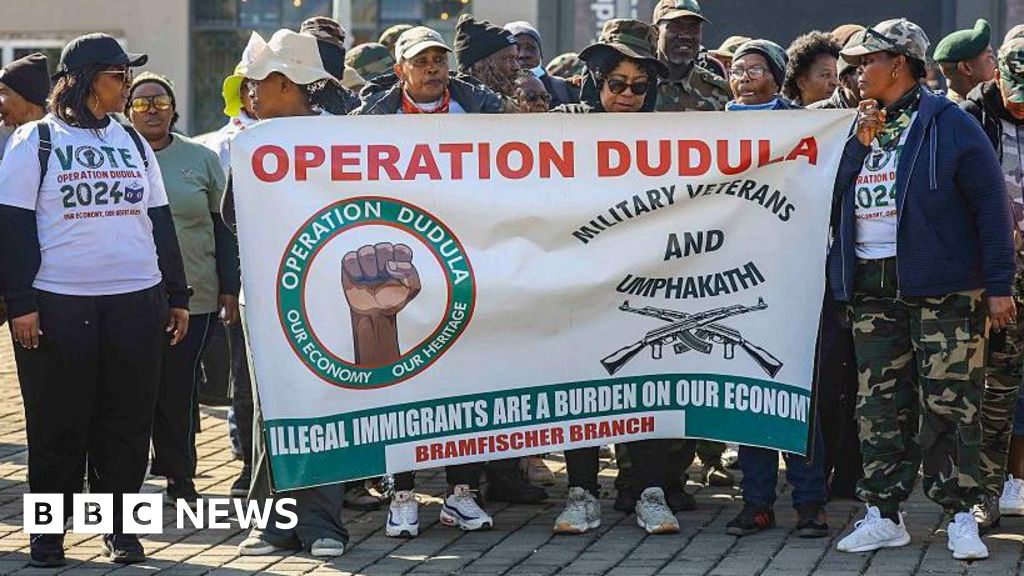Anti-migrant group ordered to stop blocking foreigners from South African healthcare

South African Court Orders Anti-Migrant Group to Cease Blocking Healthcare Access
A South African court has issued an order compelling Operation Dudula, an anti-migrant organisation, to immediately cease its activities of obstructing foreign nationals from accessing public healthcare facilities and schools. The Johannesburg High Court ruling follows a legal challenge brought by human rights groups concerned about the group's increasingly aggressive tactics.
Operation Dudula, whose name translates to "force out" or "remove" in Zulu, has been staging protests and pickets at hospitals, clinics, and schools, primarily in Gauteng and KwaZulu-Natal provinces. Members have been accused of demanding identification documents and preventing individuals they deem to be non-South African from entering these facilities. These actions have drawn widespread condemnation from rights organisations and raised concerns about rising xenophobia in the country.
Court Ruling Condemns Intimidation and Hate Speech
Judge Leicester Adams' ruling explicitly prohibits Operation Dudula from "intimidating, harassing [or] interfering with access" to healthcare and educational institutions. Furthermore, the court order bars the group from making statements that could be construed as hate speech, unlawfully evicting foreign nationals from their homes or trading stalls, and inciting others to engage in such activities. The ruling also addresses concerns about law enforcement, stipulating that police officers must have "reasonable suspicion" before requesting identification from individuals and prohibiting warrant-less searches of private residences.
The South African Police Service (SAPS) has faced criticism for its perceived inaction against Operation Dudula's activities. While some members were arrested in August for obstructing access to healthcare facilities, they were later released with a warning. The court order now places a clear obligation on the SAPS to enforce the ruling and protect vulnerable communities.
Xenophobia a Long-Standing Challenge in South Africa
South Africa is home to an estimated 2.4 million migrants, representing less than 4% of the total population, according to official figures. The majority originate from neighbouring countries such as Lesotho, Zimbabwe, and Mozambique, nations that have historically supplied migrant labour to South Africa's economy. However, xenophobia has remained a persistent problem, punctuated by periodic outbreaks of violence and fuelled by economic anxieties and political opportunism.
Dr. Liesl Louw, a researcher at the African Centre for Migration & Society at the University of the Witwatersrand, notes that "the current anti-migrant sentiment is rooted in a complex interplay of factors, including high unemployment rates, inequality, and a history of discriminatory policies. While economic competition is often cited as a driver of xenophobia, it's crucial to recognise the role of political rhetoric and the scapegoating of migrants for broader societal problems."
Reactions to the Court Order
Operation Dudula has expressed disappointment with the court's decision and intends to appeal, according to local media reports. However, Kopanang Africa Against Xenophobia, one of the organisations that brought the case to court, welcomed the ruling as providing "critical protection for those targeted by xenophobic attacks."
Kopanang has pledged to actively monitor compliance with the court order at schools and clinics. The organisation has also vowed to hold the police accountable for enforcing the order and report any inaction to oversight bodies.
South Africa's Health Minister, Dr. Aaron Motsoaledi, stated that the ruling was "to be expected" and aligned with the government's policy of ensuring access to healthcare for all, regardless of legal status. Dr. Motsoaledi previously met with Operation Dudula leaders in August and criticised their methods of protesting at healthcare facilities.
He also highlighted the challenges faced by South Africa's healthcare system, exacerbated by the influx of migrants, and called on neighbouring countries to do more to alleviate the pressure. "It is South Africa which is suffering, not them. In fact, many of them are relieved," he said, referring to the burden on the healthcare system.
Looking Ahead: Addressing the Root Causes of Xenophobia
The court ruling represents a significant victory for human rights advocates and a crucial step in protecting vulnerable migrant communities. However, experts emphasize that addressing the underlying causes of xenophobia requires a multi-faceted approach. This includes tackling unemployment and inequality, promoting social cohesion, and combating the spread of misinformation and hate speech.
As Professor John Stremlau, a visiting scholar at the University of Pretoria, argues, "South Africa needs a comprehensive strategy to manage migration effectively, one that balances the legitimate concerns of citizens with the rights and dignity of migrants. This requires not only strong legal frameworks and effective law enforcement but also a commitment to education, dialogue, and inclusive development policies."
Originally sourced from: BBC News Africa
